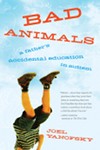Joel Yanofsky and his wife share an Asshole List – a running tab of fathers who are even worse than he is. When they meet a new one or hear stories, Joel looks so good in comparison that rare marital sex ensues. Hey, I’m only reporting what I read.
Author of the new memoir Bad Animals: A Father’s Accidental Education in Autism, Yanofsky – though he portrays himself as not so charming a person – is an endearing and intelligent writer. After years devoted to reading, he finds himself, in his forties, finally ready for “[my] life to have the kind of narrative structure and coherence it had always lacked.” In other words, settle down and have a baby.
Jonah’s birth is a small miracle. Yanofsky and his wife, together only briefly when she gets pregnant, say yes to this great adventure. The child is so beautiful that Yanofsky alf-seriously wonders if Uma Thurman and Ethan Hawke’s new baby had been “switched at birth and that somewhere, in Hollywood or Martha’s Vineyard, our real kid had a nanny and a pony and a swimming pool …” As he grows into toddlerhood, “it was almost embarrassing. There was no way to account for his exquisite cheekbones, his strong chin, his light brown hair, and his perfectly unobtrusive nose.”

Bad Animals: A Father’s Accidental Education In Autism
Joel Yanofsky
Viking Canada
$34.00
paper
288pp
9780670065103
What follows is a wide-ranging journey through the chaos of the next eight years of their lives. At one point there are “as many as four therapists doing three-hour shifts seven days a week” in their house. Bouncing between strategies, approaches and orthodoxies, Yanofsky and his wife are at turns confident and desperate. Yanofsky admits, “Cynthia and I retreated to our bedroom, closed the door, and put pillows over our heads to shut out what was being inflicted on our son, what we were, by proxy, inflicting on him.”
The author dives bravely into the contradictions and conflicts that raising an autistic child – let alone any child – engenders. It comes close to undoing Yanofsky’s marriage, and it clearly undoes Yanofsky daily. Recalling the book of Job, he identifies with the Biblical character’s endless travails. “What must [Job] have been thinking when it finally sunk in that all of it was gone? Only one thing: It wasn’t supposed to be like this.”
Yanofsky doesn’t shy away from his own shortcomings. He confesses that he ducks out of family duties and obligations: “I’m a consistent no-show at Jonah’s play dates.” Other shortcomings are left to the reader to judge, such as how he pulls back from hugging or kissing Jonah. And in case the reader misses it, there’s always his wife to point out a flaw. The repeated intrusions of Cynthia, in the form of italicized commentaries inserted by her husband, are annoying and frivolous. “First, sweetheart, calm down.” “Breathe, sweet- heart.” “It’s nothing you can’t do, too, sweetheart.” “Who are you talking about, sweetheart? Because that sounds like you.” It’s one thing for someone to be written into a memoir, but quite another for him or her to function as a literary device.
Yanofsky’s journey from shock to denial, then acceptance to pride is an affecting one. In between, father and son share a sense of humour that is genuinely wonky. It is in these moments of sharing, when the two collaborate on an ongoing bedtime story about the “Worst-Daddy- Ever,” or when Yanofsky wonders whether he should do something about an idea for the “S.O.S. League or Superheroes on the Spectrum,” that you know that Bad Animals will have a great sequel, whatever it’s called. mRb






0 Comments